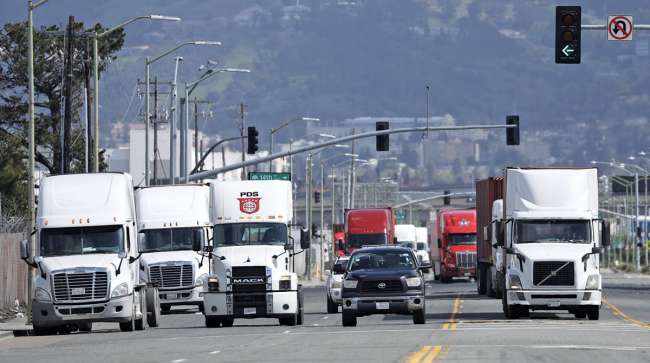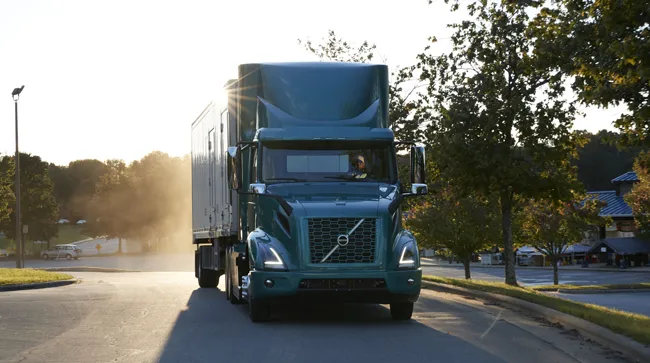Senior Reporter
Trucking Grapples With Economy, Lawsuits, EV Rules in 2024

[Stay on top of transportation news: Get TTNews in your inbox.]
In 2024, truckers traveling the nation’s highways couldn’t help but notice the construction zones popping up like springtime Texas wildflowers, offering evidence of the road and bridge improvement investments during the third anniversary of the $1.2 trillion bipartisan infrastructure law passed in 2021.
There was more to come. In October, transportation officials announced a $62 billion chunk of funding to continue road, bridge and tunnel improvements across all 50 states.
Of course, even that good news could not solve a lingering nationwide truck parking shortage, stop an assault on the independent owner-operator model, slow regulatory pressure to replace diesel trucks with electric vehicles or stem the increasing number of nuclear jury verdicts in the nation’s courtrooms.
Another sign of the times in 2024 was the continued concern over the economy. For the second year in a row, it was the No. 1 industry concern expressed in a survey by the American Transportation Research Institute. The cause for concern: the combined impacts of rising operational costs with the lingering freight recession and declining freight rates, according to the ATRI report.
#1: The Economy
Rising operational costs and a stagnant freight economy continue to weigh on the industry. #ATAmce24 pic.twitter.com/zWghpV8SSc — American Trucking (@TRUCKINGdotORG) October 12, 2024
But by year-end, experts were optimistic that the economic doldrums might improve in 2025.
The year started out with a bad omen for independent contractors and motor carriers who depend on them. On Jan. 9, the U.S. Department of Labor announced it was adopting a multistep “economic factors” test for companies to follow to determine whether a worker should be classified as an independent contractor or employee, adding a layer of regulatory oversight that transportation stakeholders warned could upend the business model for independent truck drivers.
The federal law was modeled after one in California known as AB 5. The California Trucking Association has for years waged a legal battle against it, as the law forces fleets there to reclassify owner-operators as employees. In August, however, the latest in a series of legal setbacks in its fight compelled CTA to throw in the towel and cease its challenges.
Otherwise, it was a quiet year for trucking on the regulatory side, said Dan Horvath, American Trucking Associations senior vice president of regulatory affairs and safety policy.

Horvath
“I think 2024 was a different year in the sense that there weren’t any major rulemakings that were emerging on a regular basis,” he said.
That’s not to say there hadn’t been plans for federal trucking regulators to do so. But in July, for example, regulators announced they were delaying until 2025 a supplemental heavy-duty truck speed limiter proposed rule, an automatic emergency braking final rule and a proposed new truck driver seizure standard.
“What we did see was the Federal Motor Carrier Safety Administration perhaps move the needle forward on some general regulatory items such as expanding the Compliance Safety Accountability crash preventability program,” Horvath said. “It isn’t a major rulemaking, but by the same token it’s really an important piece of the broader regulatory puzzle for our trucking companies. Expanding the program allows the carrier to challenge that crash and have it marked as not preventable on their profile.”
He added, “From a purely safety perspective, I’d say the biggest regulatory item that is still pending and will be for some time was the Drug Enforcement Agency’s proposal to downgrade marijuana from Schedule I to a Schedule III drug. That was back on May 27. That was a big one. We’re still waiting for a response from the Department of Transportation as to how motor carriers are going to be impacted if there was a rescheduling. The concern is that regulators could decide to no longer test for marijuana.”
But there was no indication that the frequency and number of nuclear lawsuits declined in 2024, according to Doug Marcello, an attorney with the Harrisburg, Pa., law firm of Saxton & Stump.

Marcello
“In fact, they seem to be escalating to the point that we’re starting to reach crisis proportions in terms of the impact they’re having on the industry as a whole, and with insurance,” Marcello said. “There’s no indication of it letting up. The number and the amounts of the verdicts out there have been very disturbing.”
But there has been progress, as some states have sought to curtail the trend at a more local level.
“In Georgia, for example, Gov. Brian Kemp is making it a priority,” Marcello said. “Over the last several years, Florida and other states have enacted some abuse reforms law. Hopefully, we’ll see that trend continuing. But it’s a multitier approach that is necessary, because even if the legislators enact lawsuit abuse reforms, the next thing is for the elected judges to enforce the laws in a manner to reduce lawsuit abuse.” Marcello added that judicial interpretations also play a key role in case outcomes.
Decarbonization
For many, the quest by California and Environmental Protection Agency regulators to mandate a rapid transition from diesel to electric trucks was the most concerning development for fleets in 2024.
“Out of all the regulatory items that were discussed in 2024, certainly emissions standards, greenhouse gas emissions standards, would top that list,” Horvath said. “That would include the EPA’s greenhouse gas Phase 3 standards for heavy-duty vehicles.”
The EPA rulemaking, announced in March, set stringent standards and timelines to reduce greenhouse gas emissions from heavy-duty vehicles from model years 2027 to 2032. The rule relies heavily on battery-electric and hydrogen-electric power systems.

Volvo's VNR Electric truck. EPA's stringent timeline to reduce emissions from heavy-duty vehicles will rely in part on OEMs developing battery-electric and hydrogen-electric power systems that achieve cost parity with diesel vehicles. (Volvo)
There were a number of other noteworthy efforts underway in 2024. Some of them included:
- At year-end, a controversy over a $17.9 billion contract to improve moving services for military members and their families still was not workable, according to a number of members of large moving companies who said the military had not yet explained how the contract would work. At press time, the contract was being examined by the Government Accountability Office.
- An Advisory Committee on Underride Protection was tasked with providing information, advice and recommendations to the secretary of transportation on safety regulations to reduce underride crashes and fatalities. In the end, the committee’s final report called on the National Highway Traffic Safety Administration to pursue a rule requiring side underride guards on heavy trucks. NHTSA declined.
- FMCSA created a Predatory Leasing Task Force to evaluate lease agreements in the industry and their potential safety and financial impacts on owner-operators. At press time, the task force was continuing its work but had identified myriad lease agreements that left owner-operators in financial straits.
- While driver detention has decreased slightly in recent years, the overall costs of being detained at customer facilities for more than two hours remain substantial, an ATRI analysis made public in September concluded. Drivers reported being detained during 39.3% of deliveries, resulting in major consequences for industry productivity and safety, according to ATRI’s 2024 survey of 587 drivers.
- In May, a string of an estimated 100 staged accidents with tractor-trailers in the New Orleans area turned grisly when two of the scammers were charged with the 2020 murder of a co-conspirator who was cooperating with the FBI. One woman has since pleaded guilty. A 10-count indictment in December charged two law firms, two individual attorneys and multiple participants in a sweeping witness tampering and murder conspiracy.
Want more news? Listen to today's daily briefing below or go here for more info:




